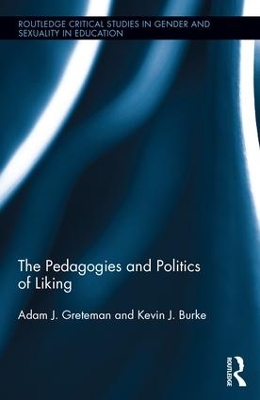Routledge Critical Studies in Gender and Sexuality in Education
1 total work
The Pedagogies and Politics of Liking
by Adam Greteman and Kevin J. Burke
This book explores the usage and significance of the word "like" across a wide range of disciplines, focusing in particular on its influence in education and pedagogy. From the advent of the "like button" on Facebook to the common verbal tic, liking has become an integral part of our everyday lives. By drawing on feminist, queer, and other critical traditions, the authors evaluate this phenomenon in order to interrogate its history, its linguistic function, its role in labor and economics, and its ties to, and separation from, religion. As the notion of "like" becomes more and more ubiquitous, this critical volume demonstrates the need to consider like, liking, and likeability when thinking about the institutions that impact us daily.
